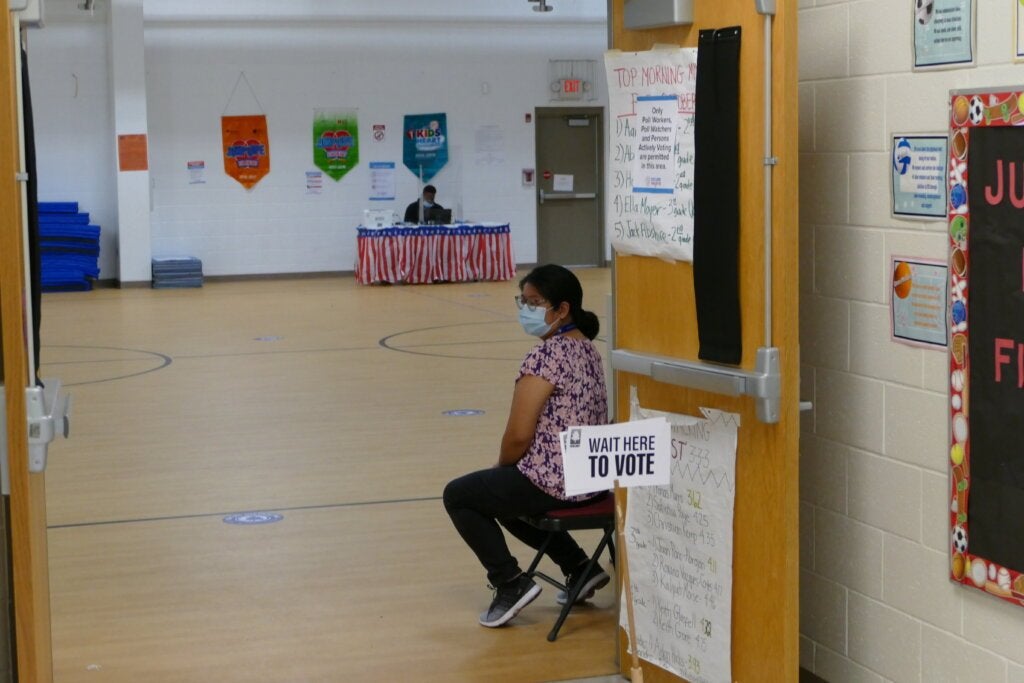BY: STANLEY DUNLAP | JULY 29, 2021 | Georgia Recorder
Georgia Attorney General Chris Carr says a U.S. Department of Justice lawsuit claiming the state’s new voting law is discriminatory should be dismissed because it relies on arguments rejected in a recent U.S. Supreme Court ruling.
The Republican Carr filed the motion to throw out the Northern District of Georgia case on Wednesday, saying that the federal prosecutors have not proven that the new provisions on absentee ballot drop boxes, voter ID, and others are unconstitutional. Carr’s brief says the federal complaint is “political posturing rather than a serious legal challenge.”
On June 25, Georgia became the first state under President Joe Biden’s administration to face a U.S. Department of Justice lawsuit over claims that the Republican state lawmakers passed a sweeping voting law this year making it harder for Black Georgians to vote.
The primary basis of the federal prosecutors’ claim is that the intent behind the new rules, including fewer absentee drop boxes than were available in 2020 and a shortened timeline for requesting ballots, are discriminatory. Carr’s motion on Wednesday disputes that Senate Bill 202 violates Section 2 of the Voting Rights Act that prohibits discrimination based on race, color or language.
[adrotate banner=”19″]
“Even if intent had any relevance under Section 2, the complaint fails to allege facts showing discriminatory intent because it fails to allege an act or statement from any Georgia legislator suggesting such an attack behind SB 202,” Carr says in the filing.
After record voter turnout in the 2020 general election, Georgia and many other Republican-dominated state legislatures passed new voting laws, with Senate Bill 202 serving as a notorious national poster child. But Carr said the lawsuit expands voting access by mandating additional weekend voting while enforcing new security measures that make it “harder to cheat.”
“The DOJ relies only on innuendo and hyperbole, neither of which can overcome its pleading deficiencies,” Carr said. “The complaint rests on political posturing rather than a serious legal challenge to SB 202.”
Carr also says Georgia’s new rule that reduces the window for voters to cast out-of-precinct ballots is supported by the July 1 U.S. Supreme Court ruling that rejected a suit challenging Arizona’s similar policy.
In the Supreme Court order, Justice Samuel Alito wrote in the majority opinion that the size of disparities on minorities in voting laws should be the primary factor in determining if a rule violates the surviving provisions of the Voting Rights Act.
Arizona’s case “emphasized that Section 2 claims must be assessed under the totality of circumstances noting that voters must tolerate the usual burdens of voting and that mere inconvenience cannot be enough to demonstrate a violation of Section 2,” Carr wrote.
Carr also argues that while the Justice Department is suing to invalidate Georgia’s new law, the Justice Department has been “noticeably silent” about similar election laws in Delaware, New York, Rhode Island, New Jersey, Maryland, and Wisconsin.
But Anthony Michael Kreis, a constitutional law professor at Georgia State University, said Carr misses the point that voting rights can be applied uniformly across those states.
[adrotate banner=”54″]
“Georgia’s demographics are not like New Jersey. They’re not like Delaware,” Kreis said. “Our demographics are very different. The political coalitions that are here are very different. And the whole lead up to SB 202’s enactment provides a unique set of circumstances that are not present in any of those states.”
“If there’s some racial dynamic to states pulling back, right and retrenching access to the ballot box and we know that deserves extra scrutiny from the Department of Justice Civil Rights Division and the courts,” Kreis said.
Georgia’s voting regulations are also getting challenged in seven other federal lawsuits, many of which also allege the state’s potential takeover of election boards and limits on the absentee drop boxes that grew popular in the pandemic are racially discriminatory.
The American Civil Liberties Union and other groups behind those suits face long odds after the Supreme Court ruling earlier this month created a near impossible standard to overcome, according to legal experts.
Gov. Brian Kemp said the DOJ’s lawsuit is a politically charged attempt to control Georgia’s voting rules in response to President Joe Biden and Congressional Democrats’ failed attempts to pass federal election legislation.
“Their lawsuit is loaded with partisan talking points and outright falsehoods because it is political propaganda aimed at justifying their unconstitutional federal takeover of elections across the country,” the GOP governor said in a statement. “SB 202 provisions like requiring voter ID on absentee ballots, securing drop boxes around the clock, and expanding weekend voting opportunities are common sense reforms that ensure Georgia elections are secure, accessible, and fair.”
[adrotate banner=”37″]








